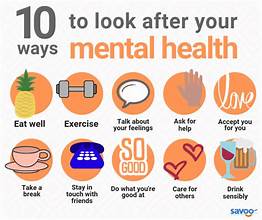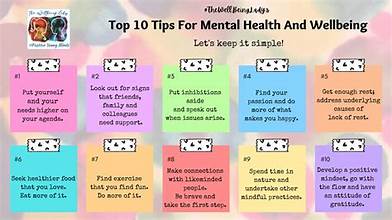In the fast-paced world of 2024, maintaining mental health is more crucial than ever for enhancing both personal well-being and professional productivity. With increasing stress levels and the pressures of modern life, adopting effective mental health strategies can lead to a more balanced and fulfilling life. Here are the top 10 mental health tips to boost your well-being and productivity this year:
1. Prioritize Self-Care
Self-care is fundamental to maintaining good mental health. It involves taking time out of your day to engage in activities that rejuvenate your mind and body. Whether it’s reading a book, taking a relaxing bath, or enjoying a hobby, self-care helps reduce stress and improve overall well-being. Schedule regular breaks and allocate time for self-care to prevent burnout and enhance productivity.
2. Practice Mindfulness and Meditation
Mindfulness and meditation are powerful tools for managing stress and improving focus. These practices help you stay present, reduce anxiety, and increase emotional resilience. Incorporate mindfulness exercises into your daily routine, such as deep breathing or guided meditation. Apps like Headspace or Calm can provide structured guidance to help you get started.
3. Maintain a Balanced Diet
Nutrition plays a significant role in mental health. A balanced diet rich in vitamins, minerals, and omega-3 fatty acids supports brain function and mood regulation. Incorporate a variety of fruits, vegetables, whole grains, and lean proteins into your meals. Avoid excessive caffeine and sugar, as they can contribute to mood swings and energy crashes.
4. Stay Physically Active
Regular physical activity is essential for mental well-being. Exercise releases endorphins, which are natural mood lifters. Aim for at least 150 minutes of moderate aerobic activity or 75 minutes of vigorous activity each week. Activities like walking, jogging, or yoga can improve your mood, reduce anxiety, and enhance cognitive function.
5. Set Realistic Goals
Setting realistic and achievable goals is key to maintaining motivation and reducing stress. Break down larger tasks into smaller, manageable steps and celebrate your progress along the way. Use tools like to-do lists or project management apps to stay organized and focused. Setting clear, achievable goals helps you stay motivated and increases productivity.
6. Foster Strong Relationships
Building and maintaining supportive relationships is crucial for mental health. Social connections provide emotional support, reduce feelings of loneliness, and offer a sense of belonging. Invest time in nurturing relationships with family, friends, and colleagues. Engage in meaningful conversations and seek support when needed.
7. Limit Screen Time
Excessive screen time, especially on social media, can negatively impact mental health. It’s important to set boundaries for technology use and take regular breaks. Establish screen-free times during the day, particularly before bedtime, to improve sleep quality and reduce stress. Engage in offline activities that promote relaxation and social interaction.
8. Get Adequate Sleep
Sleep is essential for mental and physical health. Aim for 7-9 hours of quality sleep each night. Establish a consistent sleep routine by going to bed and waking up at the same time each day. Create a relaxing bedtime routine and ensure your sleep environment is comfortable and free from distractions.
9. Seek Professional Help
If you’re struggling with mental health issues, don’t hesitate to seek professional help. Mental health professionals, such as therapists or counselors, can provide support and strategies for managing stress, anxiety, or depression. Therapy can offer valuable insights and coping mechanisms to improve your overall mental health.
10. Practice Gratitude
Gratitude practices can significantly enhance mental well-being and productivity. Taking time each day to reflect on things you’re grateful for can shift your focus from stressors to positive aspects of your life. Consider keeping a gratitude journal or expressing appreciation to others to foster a positive mindset.
Conclusion
Implementing these mental health tips can lead to significant improvements in your well-being and productivity in 2024. By prioritizing self-care, staying active, setting realistic goals, and fostering strong relationships, you can create a balanced and fulfilling life. Remember, maintaining mental health is an ongoing process, and small, consistent efforts can lead to lasting benefits. Embrace these strategies to enhance your mental health and achieve your personal and professional goals this year.


